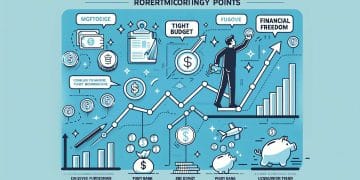Achieve Financial Freedom: Essential Personal Budgeting Tips


**Achieving Financial Freedom Through Personal Budgeting**
Anúncios
In today’s fast-paced lifestyle, maintaining financial stability can be overwhelming. Personal budgeting emerges as a solution, providing clarity and control over your finances, allowing you to plan, save, and potentially invest wisely. It is a critical element of financial literacy, emphasizing the importance of budgeting for anyone striving for financial freedom and security. Whether you are a beginner just stepping onto the financial path or someone refining their skills, this article outlines key strategies for effective personal budgeting.
Understanding how to manage finances is crucial in today’s economic climate. Personal budgeting holds immense importance, primarily because it helps in locating and reducing unnecessary expenses, thus enhancing your savings potential. It facilitates better financial planning by preparing you for unforeseen expenses and enabling you to meet future aspirations like homeownership, retirement funds, or vacations. This awareness and discipline foster long-term financial health and security, making personal budgeting an indispensable tool for anyone.
Mastering personal budgeting not only aids in financial management but also in setting and achieving financial goals. Proper budgeting enables individuals to remain focused, disciplined, and informed about their monetary decisions. By adhering to a structured budget, you can intentionally create a pathway towards eliminating debt or accumulating wealth for future endeavors. This structured approach is not only about spreadsheets and numbers, but a mindful practice that forms the foundation for sound finances and even stress reduction, due to attained financial security.
Embarking on Your Budgeting Journey
Understanding your income and expenses is the first key step in personal budgeting. Start by calculating your monthly income from diverse sources, including salary, freelances, and passive incomes. From there, meticulously track monthly expenses, encompassing everything from fixed payments such as rent and utility bills, to more fluctuating costs like groceries and dining. Knowing these figures provides a clear picture of your financial standing and highlights areas for possible savings.
Once you’ve settled into understanding your finances, setting clear financial goals is the next logical step. Clearly defined goals grant you motivation to maintain budget discipline and provide direction for your financial choices. Whether the goal is debt repayment, savings for a significant purchase like a house, or simply establishing an emergency fund, measurable objectives are necessary to guide intelligent budgeting decisions. These goals will continuously refine and sustain your budgeting practices over time.
Creating a viable, realistic budget is made easier with strategies such as the 50/30/20 rule. This simple approach suggests dedicating 50% of your income to necessities, 30% to wants, and the remaining 20% toward savings and debt repayment. This method simplifies your allocation process, ensuring that you adequately cover essentials while still indulging in personal desires and savings. Embracing this strategy can make budgeting less burdensome and more balanced.
Utilizing digital budgeting tools and apps can significantly enhance your financial tracking abilities. Modern tools like Mint, YNAB, and PocketGuard categorize expenses, automate savings, and ultimately provide clearer financial insights. By leveraging these digital assets, you can manage your finances intricately, enabling necessary adjustments to stay within budget and efficiently meet financial targets. Digital solutions are now integral in maintaining financial oversight with ease.
An effective budget must be flexible and subject to regular reviews and adaptation. Life’s circumstances such as salary changes or unexpected expenses impact the original budget framework. Monthly budget reviews confirm your periodic financial progress and highlight areas for adjustment or improvement. This continual assessment keeps your financial plans aligned with your goals and helps build robust financial habits that sustain long-term prosperity.
Critical Features of Personal Budgeting
- Understanding Income and Expenses
- Setting Measurable Financial Goals
- Implementing the 50/30/20 Rule
- Using Digital Budgeting Tools
- Regular Budget Reviews
Advantages of Adopting Personal Budgeting
Adopting personal budgeting brings numerous benefits. Saving systematically becomes a non-negotiable part of your routine. Consider automating savings to routinely set aside funds monthly. Aim to cultivate an emergency fund covering three to six months of living expenses, thus cushioning financial uncertainties. This practice leads to financial security and stability by ensuring preparedness against unforeseen financial challenges, such as job loss or medical emergencies.
Mindful spending should be a priority, ensuring that your monetary allocations align with your long-term financial objectives. Before making purchases, consciously consider whether it’s a necessity or an indulgence. Adopting this spend-smart approach encourages careful consideration of each expenditure, ensuring your money contributes significantly to your own goals and joys, thereby enhancing quality of life.
Understanding that effective budgeting requires discipline and ongoing adaptation is crucial. By gaining insight into your current financial status, setting precise goals, cultivating an actionable budget, and reviewing progress consistently, firm control over finances will emerge. The foundation laid through budgeting nurtures responsible expenditure and savings practices paving the path to financial freedom. Begin embracing budgeting today, taking that first step towards a financially clever future.
Personal budgeting isn’t just a habit; it’s a lifestyle requiring commitment and resilience. It allows you to treat your finances with an intentional, methodical approach to achieve career goals, retire comfortably, or live worry-free. Recognizing areas for financial growth and adjusting strategies as needed ensures long-term budget effectiveness, ultimately ushering in financial abundance and independence.
It should be a tailored strategy that reflects individual circumstances and life stages. Flexible budgeting accounts for life’s unpredictability, offering an adaptable yet reliable guide through diverse financial landscapes. Properly executing budget plans will ultimately lead to healthier financial practices, reducing uncertainty and setting you on a confident path to realize life’s aspirations.
- Automate Savings
- Build an Emergency Fund
- Practice Conscious Spending
- Adjust as Life Changes
- Commit to the Budget Cycle





